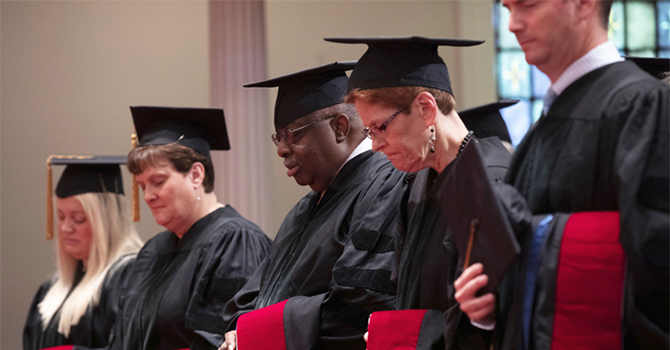What do you need most right now?
The answer to this one question can tell me where leaders place their priorities, what keeps them up at night and where they are finding hope in the world.
But during the pandemic, I have found that social distancing and stay-at-home orders have dramatically changed leaders’ answers to “What do you need most?”
Recently, a friend responded by saying, “I need someone to carry hard things with me.”
Notice that he didn’t ask for someone to solve his problems or take them away; he simply needs someone to walk alongside him. He needs a holy friend.
Theologian L. Gregory Jones defines holy friends as those who “challenge the sins we have come to love, affirm the gifts we are afraid to claim and help us dream dreams we otherwise would not dream.” While those defining characteristics of holy friends are critical to human flourishing, they take on even greater importance in the midst of a pandemic.
Holy friends are what we all need most right now.
We need them because they challenge the sins we have come to love.
In this season of social distancing, we can easily let the isolation get to us. It hisses lies in our ears, questioning our gifts, talents, abilities and identities. We watch another church’s online worship service and convince ourselves that they are better than we are.
We see what creative programming another community is offering and tell ourselves that they are more committed to their work. We compare our collective social media likes, comments and views with those of our peers and berate ourselves for not being more innovative or novel in our posting.
But these messages are not true. They are lies our shadow selves broadcast to our vulnerable spirits when we are exhausted and overwhelmed trying to figure out new technologies and ways to connect with our communities while at the same time juggling other stressors.
We are working from home, overseeing our children’s education, ensuring that those we love are safe, providing for those who have lost their income and sense of purpose, cooking meals with only half the ingredients, and wondering whether every cough we hear is a result of allergies or the first sign of COVID-19.
In a pandemic, holy friends remind us that our shadow selves are quick to dig up the failures of our past and dwell on our inadequacies. Holy friends confront our default response that says, “I’m fine; everything is fine” and speak truth to our stoicism.
Holy friends remind us, “Everything is not fine. You are not fine. Everyone is traumatized in this season, not in the same way, but definitely at the same time. It is OK not to be fine -- it is actually the new normal.”
None of us can claim to know what we are doing. We are all being called upon to do things we have never done before, things we never imagined having to do.
And yet we hold ourselves to unreasonably high standards and then berate ourselves for not being as shiny, savvy or smart as our neighbors. Holy friends challenge the negative messages we tell ourselves, speaking words of truth, grace and peace.
Further, we need holy friends because they affirm the gifts we are afraid to claim.
Desperation breeds innovation. When we look back on times of crisis or chaos, we realize that increased constraints can prompt creativity. We find new ways to sustain that which is critical to our functioning.
Recall Apollo 13. In the wake of a devastating explosion, the NASA ground crew had to improvise, using the lunar module materials in ways they were not designed to function to get the space crew safely home. Scientists and engineers used gifts and talents they never expected to need in such a circumstance.
What gifts do you find yourself leaning into while living under stay-at-home orders? Under normal circumstances, I would not consider myself a baker, but lately I find myself delivering loaves of sourdough bread and freshly made cinnamon rolls to my neighbors’ porches.
I have discovered numerous friends on social media who would not claim to be seamstresses, yet they spend their days sewing masks for health care providers.
A colleague who is by no means an expert at yoga now has a faithful following of Zoom yogis because they enjoy her casual, breezy approach.
Holy friends affirm the gifts they notice showing up in the lives of others. They name them so the world can partake in the gifts and the person gifting feels seen and encouraged.
Finally, we need holy friends because they help us dream dreams we otherwise would not dream.
One of the double-edged swords of this disruptive season is the exposure of the vast inequities and brokenness in our systems and structures. While coming face to face with the associated pain and suffering is uncomfortable and awkward, this awareness opens our imaginations to reweave the social fabric of our institutions.
Bright strands of hope and possibility for more fair and just systems are beginning to appear. People are envisioning a future that aligns earth as it is in heaven.
Communities are finding new imaginations for what it looks like to bear witness to the reign of God. Churches are re-envisioning who and what their neighbors need them to be.
Holy friends are the cheerleaders in the path shouting, “It’s OK if you don’t know whether your idea will work. Try it! Try something! You’ll learn in the process.”
We should listen to them. Your holy friends are qualified to dispense this advice because they know you, they know your context and they know how committed you are to your calling and vocation.
Who is the person who speaks truth to the lies your shadow self hisses in your ear? Who is the one who pushes you to claim unused gifts? Who is the friend who encourages your hunches and helps you feel creative and generative?
These are your holy friends. These are the voices you need to hear.
Holy friends are critical to human flourishing when life is “normal” (whatever that used to look like) -- and they are lifesaving in a pandemic.

















